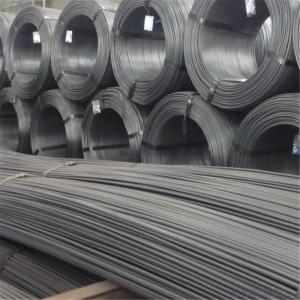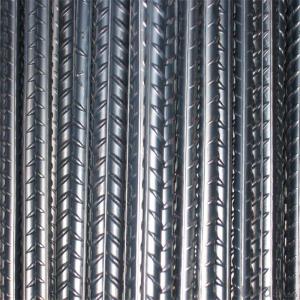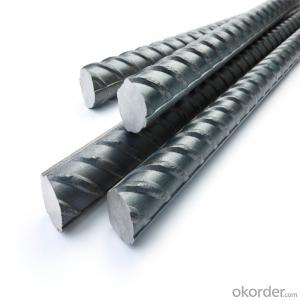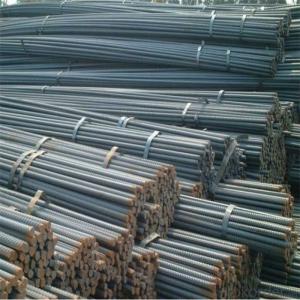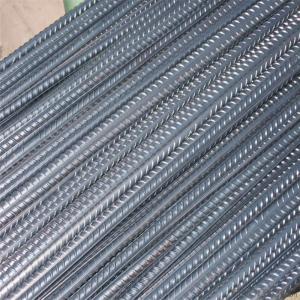ASTM Reinforcing Steel Rebar
- Loading Port:
- Tianjin
- Payment Terms:
- TT OR LC
- Min Order Qty:
- 190 m.t.
- Supply Capability:
- 500000 m.t./month
OKorder Service Pledge
OKorder Financial Service
You Might Also Like
Item specifice
ASTM Reinforcing Steel Rebar
Description of ASTM Reinforcing Steel Rebar
1, Diameter: 5.5mm-10mm ASTM Reinforcing Steel Rebar
10m- 40mm ASTM Reinforcing Steel Rebar
2, Length: 6m, 9m, 12m or customized
3, Standard: GB, ASTM, AISI, SAE, DIN, JIS, EN
OEM technology - send detailed technical parameters for accurate quotation.
2, Produce Process: smelt iron - EAF smelt billet - ESR smelt billet -
hot rolled or forged to get the steel round bar and plate
3, Heat Treatment: annealing, normalizing, tempering, quenching
4, Surface Treatment: Black
5, Quality Assurance: We accept third party inspection for all orders.
You can ask testing organizations such as SGS, BV, etc. to test our products before shipping.
Chemical Composition of ASTM Reinforcing Steel Rebar
Grade | Technical data of the original chemical composition(%) | |||||
Reinforcing steel bar HRB335 | C | Mn | Si | S | P | B |
≤0.25 | ≤1.60 | ≤0.80 | ≤0.045 | ≤0.045 | >0.0008 | |
Physics Capability | ||||||
Yield Strength(N/cm2) | Tensile Strength(N/cm2) | Elongation(%) | ||||
≥ 335 | ≥490 | ≥16 | ||||
Reinforcing steel bar HRB400 | C | Mn | Si | S | P | B |
≤0.25 | ≤0.16 | ≤0.80 | ≤0.045 | ≤0.045 | 0.04-0.12 | |
Physics Capability | ||||||
Yield Strength(N/cm2) | Tensile Strength(N/cm2) | Elongation(%) | ||||
≥ 400 | ≥ 570 | ≥ 14 | ||||
Products Show of ASTM Reinforcing Steel Rebar
Company Information
CNBM International Corporation is the most important trading platform of CNBM group.
Whith its advantages, CNBM International are mainly concentrate on Cement, Glass, Iron and Steel, Ceramics industries and devotes herself for supplying high qulity series of refractories as well as technical consultancies and logistics solutions.


F A Q
1, Your advantages?
professional products inquiry, products knowledge train (for agents), smooth goods delivery, excellent customer solution proposale
2, Test & Certificate?
SGS test is available, customer inspection before shipping is welcome, third party inspection is no problem
3, Factory or Trading Company?
CNBM is a trading company but we have so many protocol factories and CNBM works as a trading department of these factories. Also CNBM is the holding company of many factories.
4, Payment Terms?
30% TT as deposit and 70% before delivery.
Irrevocable L/C at sight.
5, Trading Terms?
EXW, FOB, CIF, FFR, CNF
6, After-sale Service?
CNBM provides the services and support you need for every step of our cooperation. We're the business partner you can trust.
For any problem, please kindly contact us at any your convenient time.
We'll reply you in our first priority within 24 hours.
- Q:How does special steel contribute to the energy aftermarket industry?
- The energy aftermarket industry heavily relies on special steel for the production and maintenance of various energy equipment and infrastructure. This type of steel is crucial as it provides durable and high-quality materials. One important application of special steel is in the manufacturing of turbine components like blades, rotors, and casings. These components are essential for power generation, especially in thermal, hydro, and wind energy systems. Special steel possesses exceptional strength, corrosion resistance, and high-temperature stability, ensuring the efficient and reliable operation of turbines even in harsh environments. Moreover, special steel plays a vital role in the construction and upkeep of oil and gas pipelines. These pipelines are responsible for transporting energy resources over long distances and require materials that can withstand extreme pressures, temperatures, and corrosive environments. Special steel grades with enhanced mechanical properties and corrosion resistance are utilized to maintain the integrity and safety of these pipelines, ultimately improving the efficiency and reliability of the energy aftermarket industry. Furthermore, special steel is used in the production of storage tanks, heat exchangers, and various other components employed in the oil, gas, and renewable energy sectors. These components are crucial for storing and processing energy resources and necessitate materials that can endure high pressures, temperature changes, and aggressive chemicals. Special steel grades provide the necessary mechanical properties and corrosion resistance, enabling safe and efficient energy storage and processing. Apart from its material properties, special steel also enables advanced manufacturing techniques like precision machining and welding. These techniques are crucial for producing complex energy equipment and components, ensuring high accuracy, reliability, and efficiency in the production process. This, in turn, leads to high-quality end products that meet the demanding requirements of the energy aftermarket industry. Overall, special steel significantly contributes to the energy aftermarket industry by providing materials with exceptional strength, corrosion resistance, and high-temperature stability. Its utilization in the manufacturing and maintenance of energy equipment and infrastructure enhances efficiency, reliability, and safety, ultimately supporting the growth and sustainability of the industry.
- Q:How does special steel contribute to the medical aftermarket industry?
- Special steel plays a crucial role in the medical aftermarket industry by providing high-quality materials necessary for manufacturing medical devices and equipment. Special steel, also known as stainless steel, offers numerous advantages that make it ideal for medical applications. First and foremost, special steel is highly resistant to corrosion and rust, which is essential in the medical field where hygiene and cleanliness are of utmost importance. Medical devices like surgical instruments, implants, and equipment need to be sterilized frequently, and the corrosion resistance of special steel ensures their durability and longevity. Additionally, special steel possesses excellent strength and hardness properties, making it suitable for medical implants and prosthetics. These implants must be strong enough to endure the stresses and strains of the human body while maintaining their structural integrity. Special steel provides the necessary strength and toughness required for these critical applications. Furthermore, special steel is biocompatible, meaning it does not cause any adverse reactions or toxicity when in contact with living tissues. This property is essential for implants and devices that come into direct contact with the human body, as it minimizes the risk of rejection or allergic reactions. Moreover, special steel's versatility allows it to be easily machined and fabricated into complex shapes and sizes, meeting the diverse requirements of medical applications. It can be formed into delicate surgical instruments, precision cutting tools, and even large-scale equipment such as hospital beds and imaging machines. The high precision and dimensional stability of special steel contribute to the accuracy and reliability of medical devices. This is especially crucial in areas like diagnostics and imaging, where precise measurements and high-quality images are vital for accurate diagnosis and treatment planning. In conclusion, special steel's corrosion resistance, strength, biocompatibility, and versatility make it an invaluable material in the medical aftermarket industry. Its use in manufacturing medical devices and equipment ensures the highest standards of hygiene, durability, and performance, ultimately contributing to the advancement of healthcare and improving patient outcomes.
- Q:Can special steel be used in the pharmaceutical industry?
- Yes, special steel can be used in the pharmaceutical industry for various applications. Special steel alloys such as stainless steel are often used to manufacture equipment and components required for pharmaceutical manufacturing processes. These steel alloys offer excellent corrosion resistance, high strength, and hygienic properties, making them suitable for pharmaceutical applications where cleanliness, durability, and sterility are crucial. Additionally, special steel can be used to construct storage tanks, piping systems, and vessels that are resistant to chemical reactions and contamination, maintaining the integrity and purity of pharmaceutical products.
- Q:What are the properties of high-strength alloy steel?
- High-strength alloy steel possesses a combination of outstanding mechanical properties such as high tensile strength, good toughness, excellent wear resistance, and superior corrosion resistance. This type of steel is known for its ability to withstand heavy loads, extreme temperatures, and harsh environments, making it suitable for applications in industries like aerospace, automotive, and construction.
- Q:What are the requirements for special steel used in corrosive environments?
- Special steels used in corrosive environments are required to have specific properties to ensure their durability and performance in such conditions. The requirements for these steels can be summarized as follows: 1. Corrosion resistance: The primary requirement for special steels used in corrosive environments is excellent corrosion resistance. These steels should be able to withstand the attack of aggressive substances such as acids, alkalis, and salts. They should exhibit minimal or no signs of corrosion, ensuring the longevity of the steel and preventing any degradation in performance. 2. High strength: Special steels used in corrosive environments should possess high strength to handle the mechanical stresses imposed on them. This property is crucial for applications where the steel is subjected to heavy loads, pressures, or impacts. High strength also helps in maintaining the integrity and structural stability of the steel in corrosive conditions. 3. Resistance to pitting and crevice corrosion: Pitting and crevice corrosion are localized forms of corrosion that can occur in the presence of certain aggressive chemicals or stagnant environments. Special steels should have resistance to such forms of corrosion, as they can lead to localized damage, reduced structural integrity, and potential failure of the steel. 4. Stress corrosion cracking resistance: Stress corrosion cracking is a phenomenon that occurs when a combination of tensile stress and a corrosive environment compromises the material's integrity. Special steels should be resistant to stress corrosion cracking, ensuring their reliability under applied loads in corrosive environments. 5. Resistance to intergranular corrosion: Intergranular corrosion can occur along grain boundaries, leading to the weakening of the material. Special steels used in corrosive environments should have good resistance to intergranular corrosion, preventing any loss in structural integrity. 6. Thermal stability: Special steels should exhibit thermal stability to maintain their properties and resist degradation at elevated temperatures. This characteristic is essential for applications involving high-temperature corrosive environments. 7. Easy maintenance: Special steels used in corrosive environments should be relatively easy to maintain. This includes aspects such as ease of cleaning, resistance to fouling or scaling, and compatibility with cleaning agents or procedures commonly used in the industry. It is important to note that the specific requirements for special steels used in corrosive environments may vary depending on the application and the type of corrosive substances encountered. Therefore, it is crucial to carefully consider the particular needs and consult with experts in the field to select the most appropriate steel for each specific corrosive environment.
- Q:How does special steel behave under different types of loading conditions?
- Special steel, also known as alloy steel, exhibits unique behavior under different types of loading conditions. It is specifically designed to possess exceptional mechanical properties, making it suitable for a wide range of applications where high strength, toughness, and resistance to wear or corrosion are required. Under tension loading, special steel demonstrates excellent tensile strength and ductility, enabling it to withstand pulling forces without easily fracturing. This property makes it ideal for applications where components are subjected to pulling or stretching forces, such as cables, structural elements, or automotive parts. When subjected to compressive loading, special steel showcases its exceptional compressive strength, allowing it to withstand forces that tend to squeeze or press it together. This makes it suitable for applications like hydraulic cylinders, crankshafts, or flanges, where resistance to compression is crucial. In terms of bending or flexural loading, special steel exhibits remarkable flexibility without losing its strength, enabling it to withstand repeated bending without deformation or failure. This property is particularly useful in applications involving springs, suspension systems, or beams subjected to dynamic loads. Special steel also demonstrates excellent fatigue resistance, which means it can withstand cyclic loading or repeated stress without failure. This property is crucial in applications subjected to continuous or repetitive loading, such as turbine blades, gears, or axles. Moreover, special steel can effectively handle impact loading, as it possesses high toughness and impact resistance. This makes it suitable for applications where sudden shocks or impacts are expected, such as hammer heads, drill bits, or armor plating. In terms of temperature loading, special steel retains its mechanical properties even at high temperatures due to its excellent heat resistance. This property makes it suitable for applications exposed to extreme heat or thermal cycling, such as turbine components, exhaust systems, or molds used in metal casting. In summary, special steel behaves differently under various loading conditions, adapting its mechanical properties to meet the specific requirements of each application. Its unique combination of strength, toughness, ductility, and resistance to wear or corrosion make it a versatile material capable of withstanding different types of loading conditions.
- Q:What are the different coating techniques for special steel?
- There are several different coating techniques that can be used for special steel to enhance its properties and protect it from corrosion or wear. Some of the commonly used coating techniques include: 1. Electroplating: In this technique, a thin layer of metal is deposited onto the surface of the steel using an electric current. This can be done with various metals such as zinc, nickel, or chrome, depending on the desired properties of the coated steel. 2. Hot-dip galvanizing: This technique involves immersing the steel in a molten zinc bath, which forms a protective layer on the surface. Hot-dip galvanizing is commonly used for outdoor applications, as it provides excellent corrosion resistance. 3. Powder coating: In this technique, a dry powder is applied to the surface of the steel and then heated to form a protective coating. Powder coating offers a wide range of colors and finishes and provides both corrosion and wear resistance. 4. Thermal spraying: This technique involves heating a coating material, such as zinc or aluminum, to a high temperature and then spraying it onto the steel surface. Thermal spraying is commonly used for high-temperature applications, as it provides excellent resistance to heat and corrosion. 5. PVD coating: Physical vapor deposition (PVD) is a technique where a thin film of metal is deposited onto the steel surface through a vacuum process. PVD coatings can provide various properties such as hardness, wear resistance, and decorative finishes. 6. Carbonitriding: This is a surface hardening technique where the steel is heated in a furnace containing a carbon and nitrogen-rich atmosphere. Carbonitriding forms a hard, wear-resistant layer on the steel surface, improving its durability. These coating techniques offer different advantages and are chosen based on the specific requirements of the application. By applying these coatings, special steel can be made more resistant to corrosion, wear, and other forms of degradation, extending its lifespan and enhancing its performance in various industries.
- Q:Can special steel be used in the production of gears?
- Yes, special steel can be used in the production of gears. Special steel, such as alloy steel or tool steel, is often preferred in gear manufacturing due to its high strength, wear resistance, and ability to withstand heavy loads and high temperatures. This steel type ensures gears have the necessary durability and performance required for various applications.
- Q:How does special steel contribute to reducing product weight?
- Special steel contributes to reducing product weight through its unique properties. Special steel is known for its high strength-to-weight ratio, which means it can provide the same level of strength and durability as other materials while being significantly lighter. By using special steel in the manufacturing process, products can be designed with thinner and lighter components without compromising their structural integrity. This reduction in weight not only makes the product more portable and easier to handle, but it also helps in reducing transportation costs and improving fuel efficiency in industries such as automotive and aerospace.
- Q:How is corrosion-resistant stainless tool steel used in the production of food processing equipment?
- Corrosion-resistant stainless tool steel is used in the production of food processing equipment due to its ability to withstand exposure to moisture, chemicals, and high temperatures. This type of steel prevents rusting and corrosion, ensuring the equipment remains hygienic and safe for food processing. It is commonly used for manufacturing blades, cutters, and other components that come into direct contact with food. Additionally, its durability and strength make it ideal for withstanding the rigorous demands of food processing operations, enhancing the equipment's longevity and performance.
1. Manufacturer Overview |
|
|---|---|
| Location | |
| Year Established | |
| Annual Output Value | |
| Main Markets | |
| Company Certifications | |
2. Manufacturer Certificates |
|
|---|---|
| a) Certification Name | |
| Range | |
| Reference | |
| Validity Period | |
3. Manufacturer Capability |
|
|---|---|
| a)Trade Capacity | |
| Nearest Port | |
| Export Percentage | |
| No.of Employees in Trade Department | |
| Language Spoken: | |
| b)Factory Information | |
| Factory Size: | |
| No. of Production Lines | |
| Contract Manufacturing | |
| Product Price Range | |
Send your message to us
ASTM Reinforcing Steel Rebar
- Loading Port:
- Tianjin
- Payment Terms:
- TT OR LC
- Min Order Qty:
- 190 m.t.
- Supply Capability:
- 500000 m.t./month
OKorder Service Pledge
OKorder Financial Service
Similar products
New products
Hot products
Related keywords
